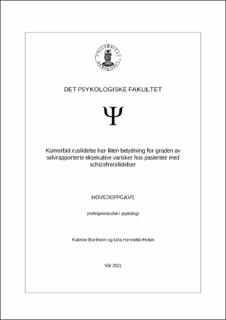| dc.contributor.author | Bortheim, Katrine | |
| dc.contributor.author | Holen, Una Henriette | |
| dc.date.accessioned | 2021-06-17T06:14:49Z | |
| dc.date.available | 2021-06-17T06:14:49Z | |
| dc.date.issued | 2021-05-19 | |
| dc.date.submitted | 2021-06-15T22:00:29Z | |
| dc.identifier.uri | https://hdl.handle.net/11250/2759851 | |
| dc.description.abstract | Formål: Vi undersøkte selvrapporterte eksekutive vansker hos pasienter med schizofrenispektrumlidelser med Behavior Rating Inventory of Executive Function- Adult Version (BRIEF-A) og om pasienter med schizofrenilidelse og komorbid ruslidelse skiller seg fra pasienter med schizofrenilidelse uten komorbid ruslidelse i grad av eksekutive vansker. Metode: Utvalget bestod av 264 pasienter med en diagnose innenfor schizofrenispekteret. Der 37,9% hadde en komorbid ruslidelse. Alle deltakerne fullførte selvrapportversjonen av BRIEF-A. Resultater: Alle skalaene på BRIEF-A i det totale utvalget var 0,5-1,5 SA over gjennomsnittet for normutvalget og mange skalaer var nær klinisk grenseverdi (T≥65). Disse funnene samsvarer godt med tidligere forskning som har målt eksekutive vansker ved schizofrenilidelse med BRIEF-A. Analyse med uavhengig t-test viste at deltakerne som hadde ruslidelse hadde signifikant høyere skåre på skalaen for impulskontroll sammenlignet med deltakerne som ikke hadde ruslidelse, men effektstørrelsen var liten (Cohen’s d=0,34). Det var ingen andre signifikante forskjeller mellom gruppene på BRIEF-A. Hovedfunnet var at begge pasientgruppene hadde overveiende like skårer på BRIEF-A, der vansker med initiering, arbeidshukommelse og planlegging/organisering var mest uttalt. | |
| dc.description.abstract | Objective: We investigated self-reported executive dysfunction in patients with Schizophrenia Spectrum Disorders with the Behavior Rating Inventory of Executive Function-Adult Version (BRIEF-A), and whether patients with schizophrenia and comorbid substance abuse disorder reported different degrees of executive dysfunction compared to patients with schizophrenia without comorbid substance abuse disorder. Methods: The sample consisted of 264 patients with schizophrenia spectrum disorders, of which 37,9% had a comorbid substance abuse disorder. All participants completed the self-report version of BRIEF-A. Results: All BRIEF-A scales for the total sample were 0,5-1,5 SD above the average of the normative sample, and many scales were near the clinical cut-off (T ≥65). Analysis with independent samples t-test revealed that the participants with comorbid substance abuse reported significantly more problems with inhibition compared to the participants without comorbid substance abuse, but the effect size was small (Cohen’s d=0,34). There were no other significant differences between the groups on the BRIEF-A. The main finding was that the two groups had predominantly similar scores on the BRIEF-A, where difficulties with initiation, working memory and planning/organizing were most pronounced. | |
| dc.language.iso | nob | |
| dc.publisher | The University of Bergen | |
| dc.rights | Copyright the Author. All rights reserved | |
| dc.subject | ruslidelse | |
| dc.subject | schizofreni | |
| dc.subject | substance abuse | |
| dc.subject | BRIEF-A | |
| dc.subject | eksekutiv funksjon | |
| dc.subject | schizophrenia | |
| dc.subject | executive function | |
| dc.title | Komorbid ruslidelse har liten betydning for graden av selvrapporterte eksekutive vansker hos pasienter med schizofrenilidelser | |
| dc.type | Master thesis | |
| dc.date.updated | 2021-06-15T22:00:29Z | |
| dc.rights.holder | Copyright the Author. All rights reserved | |
| dc.description.degree | Hovudoppgåve psykologprogrammet | |
| dc.description.localcode | PROPSY317 | |
| dc.description.localcode | PRPSYK | |
| dc.subject.nus | 736102 | |
| fs.subjectcode | PROPSY317 | |
| fs.unitcode | 17-0-0 | |
